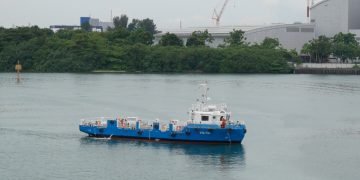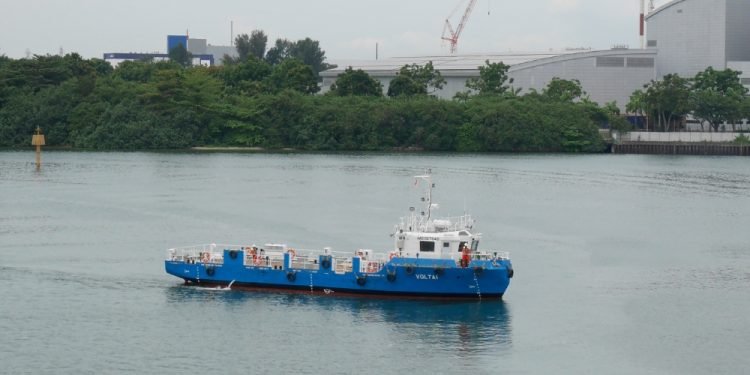By Eva Richardson | March 25, 2025 | The Logistic News
In a significant move towards sustainable maritime logistics, the Coastal Sustainability Alliance (CSA), led by the Kuok Maritime Group (KMG), has signed two pivotal Letters of Intent (LOIs) during the Accelerating Digitalisation and Decarbonisation Conference at Singapore Maritime Week (SMW) 2025. These agreements aim to enhance the adoption of electric supply boats and develop comprehensive marine charging infrastructure, marking a substantial step in transforming Singapore’s coastal logistics ecosystem.
“Milk Run” Trial for E-Supply Boat Adoption
The first LOI involves a collaboration between KMG and seven major ship agencies—GAC Singapore, Horizon Shipping Agencies, Inchcape Shipping Services, Johnasia Shipping, RMS Marine & Offshore Service, Sinoda Shipping Agency, and Wilhelmsen Port Services—along with one chandler. This partnership focuses on utilizing the PXO E-Supply Boat Voltai for deliveries to seagoing vessels in a one-year trial. The trial will implement a “milk run” model, consolidating multiple deliveries into optimized routes to enhance operational efficiency, reduce carbon emissions, alleviate marine traffic congestion, and lower operational costs associated with electric vessels.
This initiative addresses the increasing pressure on merchant shipowners to reduce Scope 3 emissions, providing a viable pathway for greener supply chain solutions. Each trip by the E-Supply Boat is projected to cut 0.5 metric tons of Scope 3 greenhouse gas emissions per arrival of a merchant ship at the Port of Singapore. With approximately 600 daily trips made by conventional supply boats, this electrification pathway could result in an estimated reduction of 9,000 metric tons of GHG emissions per month.
Development of Marine Charging Infrastructure
The second LOI sees KMG partnering with companies including BeeCharge Innovation Group, Jurong Port, Pyxis, RExus Bioenergy, SP Mobility, and Wilhelmsen Ships Service to provide charging infrastructure and facilities supporting the PXO E-Supply Boat Voltai during the “milk run” trial. This collaboration will feature a multi-modal and multi-location approach, incorporating various charging infrastructures such as shore-based charging at key waterfront sites and mobile charging powered by solar energy for on-demand needs. Operating on a common technical standard, this infrastructure is critical in accelerating MaritimeSG’s green transition by enabling efficient charging turnaround for e-vessels and minimizing operational downtime.
Public Showcase of PXO E-Supply Boat Voltai
As part of SMW 2025, the PXO E-Supply Boat Voltai, Singapore’s largest electric supply boat and one of the first to receive the Maritime and Port Authority of Singapore’s Tier 1 design for next-generation electric harbor craft, will be showcased to the public. Recently delivered from PaxOcean Batam, the Voltai boasts four times the cargo space of conventional supply boats. Visitors can explore its groundbreaking features, including an expanded cargo capacity, zero-emission propulsion system, and advanced energy storage system. The vessel’s battery energy storage system enables zero-emission operations, covering an 80-nautical-mile range at 8 knots while reducing operational costs and carbon footprint.
Leadership Perspectives
Tan Thai Yong, Managing Director and CEO of PaxOcean Group and Chairperson of CSA, emphasized the significance of these initiatives: “The commitment by leading ship agencies and a chandler to prioritize the hiring of the PXO E-Supply Boat Voltai marks a fundamental shift in maritime logistics. Implementing the ‘milk run’ model consolidates multiple deliveries into optimized routes, benefiting all stakeholders by reducing unnecessary trips, lowering operational costs, and significantly cutting emissions. This initiative can transform legacy port logistics, setting the stage for an industry-wide shift toward sustainable and efficient operations.”
Regarding the charging infrastructure partnership, he added, “By bringing together various site owners and charging partners, we envision concurrent efforts contributing to Singapore’s electric charging infrastructure along the coastline, eventually extending beyond our PXO vessels’ operating bases. Over time, we hope to see more public charging infrastructure deployed strategically and decisively along Singapore’s shoreline to support operations in the Western and Eastern anchorages.”
Conclusion
The Coastal Sustainability Alliance’s recent partnerships represent a significant advancement in the maritime industry’s journey toward sustainability. By integrating electric vessel operations with robust charging infrastructure, these initiatives not only aim to reduce emissions but also set a precedent for future developments in coastal logistics. As these projects unfold, they are poised to play a crucial role in shaping a greener, more efficient maritime landscape.























